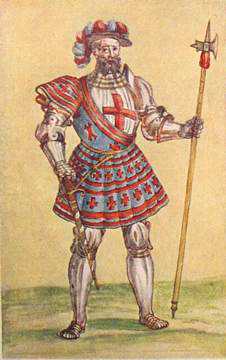Join the Army, See the World
The Reformation caused England to become more insular and wary of foreigners. As a result, individuals, especially young people who were deemed to be impressionable, were seldom allowed to leave England. Italy, especially, was off limits because Rome was considered to be infectious, and one could lose one's inheritance and social standing just for traveling there. Yet the number of soldiers engaged in military service, especially during the last twenty years of Elizabeth's reign, meant that there were more Englishmen overseas than ever before, fighting on several fronts.
Recruitment: Volunteers and Conscripts
Because there would be no standing army in England until 1660, armies had to be raised from the general population when needed. Sometimes, this was done by a recruiting officer who would travel from town to town, enticing men to enlist. The recruiting officer would be charged with making sure that all recruits were sane and fit for duty, and in some cases that they were not the only son -- for reasons of inheritance, and the need to keep businesses and farms in operation. The new soldiers would then receive their first payment and a uniform (the cost of which would sometimes be deducted from their pay), take an oath to the Queen*,) and then disembark for training or battle overseas.
In times when recruits were urgently needed, however, men were conscripted, or "pressed," often against their will. In Henry IV, Part One, Falstaff describes the tricks he used to get extra money from those he pressed:
I press me none but good householders, yeomen's sons, inquire me out contracted bachelors, such as had been asked twice of the banns -- such a commodity of warm slaves as had as lief hear the devil as a drum . . . and they have bought out their services.
(4.2.14-18)
In other words, he pressed only those who were willing to bribe him to let them go -- and finished up with a group of such "scarecrows" that he is ashamed to be seen with them.
All men between the ages of 16 and 60 were eligible to serve and had to appear at musters, where unlucky individuals would be selected for service. Moreover, these men were not necessarily trained: about twenty percent of the army was selected for training, while the rest were simply given equipment and expected to learn how to be a soldier while in the field.
As might be expected, the common soldier's lot was often an unfortunate one. As Pistol suggests by demanding of King Henry (moving amongst his troops in disguise), "Discuss unto me, art thou officer; or art thou base, common, and popular" (Henry V, 4.1.48), a soldier's military rank often dictated whether or not he would live or die. The untrained, low ranking, disenfranchised common soldier often ended up as cannon fodder -- "food for powder, food for powder" according to Falstaff ( 1 Henry IV 4.2.65) -- because the better trained more professional army was considered too valuable to send to a possible death overseas, and was held in reserve for England's defense. In fact, in 1601, Lord Mountjoy, Elizabeth's commander in Ireland, allowed his defeated enemies to enlist in foreign armies because, he claimed, "it has ever been seen that more than three parts of the four of these countrymen do never return, being once engaged in any such voyage."
Footnotes
-
Swearing allegiance
The Soldier's Oath was standardized under Elizabeth's reign:
Wee doe sweare and promise to doe all loyall true and faythefull sarvice unto the Queene of England her most Excell. majesty: and unto the provinces and citties united in theis countries and their associates, under the charge and obedience of the Right exelent the Earle of Leicester Governor general of the said proviances and citties and their associates, and of her majesties Army and forces within the same: And all lawfull and due obedience unto the Governor and to any other superior that shall charge under him for the Government in this Army: And further we do endevore our selves to keep and fulfill all such lawfull ordinances as his Exelencie hath or shall set forth and establish for the better orderinge of the Army as much as conserns us, so long as we shall serve under him, so help us God Jhesus Christe.
